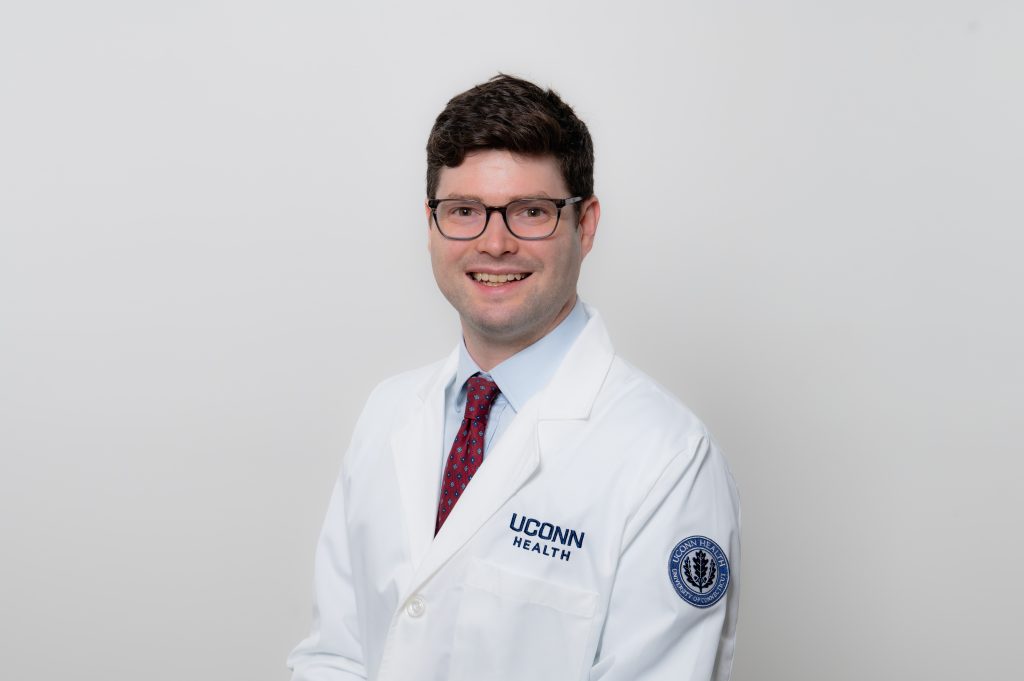A Few Simple Steps to Start Preventing Heart Disease Today
Dr. Maxwell Eder recently joined the Calhoun Cardiology Center at UConn Health. The Center is celebrating its 20th anniversary of advancing cardiovascular care, research, and training the next generation of heart doctors.
“UConn Health is an excellent place for general cardiology,” says Eder. “General cardiology allows me to care for a wide variety of heart patients which I really enjoy!”
Eder serves as an assistant professor of cardiology at UConn School of Medicine. He joined the UConn faculty from Yale where he completed both his residency and fellowship training in general cardiology.
Eder cares for patients at UConn Health ranging from those who simply want to prevent heart disease or lower their risk factors to those with a cardiovascular disease diagnosis and are being treated in the echocardiography lab or as inpatients at UConn John Dempsey Hospital.
Eder loves the heart.

“I really like the complexity of this muscle we call the heart,” says Eder. “It is more than just a muscle, a lot more. The heart has a very unique pathology, its own piping, and even its own electrical system too.”
Plus, Eder loves the heart patients he gets to meet.
“I really connect with my heart patients. It’s very gratifying to be able to offer them really great and evidence-based treatments,” Eder says who finds it also rewarding to meet with patients who are looking to prevent heart disease.
“I am happy to see all patients, but most people don’t need a practicing cardiologist to begin to prevent heart disease today, right now,” Eder says about heart disease which remains the leading cause of death of American men and women.
According to Eder, if someone has a new concern or change in their heart health or risk factors for the disease such as a sedentary lifestyle, high blood pressure, high cholesterol, was a past smoker, or has a strong family history of heart attack or stroke, it’s a very good idea to seek a consult with a cardiologist.
Eder advises three simple healthy lifestyle choices to begin preventing heart disease at any age.
First, eat heart healthy with a daily diet rich in fruits, vegetables, and high in fiber.
Second, stay active weekly with brisk walking or other vigorous exercise you enjoy. In fact, the official recommendation for exercise by the American Heart Association (AHA) is 150 minutes of moderate aerobic activity or 75 minutes of vigorous activity per week with strength training two days per week.
Lastly, don’t ever smoke, or quit smoking now, as it hardens and narrows the arteries in your body including those in the heart.
“If you eat healthy, exercise regularly, keep your cholesterol low, and avoid smoking your risk of developing heart disease will be much lower,” stresses Eder. “It’s never too early to start preventing heart disease and reducing your cardiovascular risk factors to prevent a heart attack or stroke in your lifetime.”
Eder concludes, “Live a healthy lifestyle, with everything in moderation. Do these few simple steps daily and you will be doing an amazing job of keeping your risk factors for cardiovascular disease low and maintaining your heart health.”
Latest UConn Today
- UConn Hosts Sustainability Summit for Northeast Higher EducationConference highlights UConn's sustainability leadership among universities and colleges in the northeast.
- National Impact for CT AHEC and its Urban Service Track/AHEC Scholars from UConn HealthUST/AHEC Scholars alumni from UConn's dental and medical schools present at the National AHEC Organization Conference.
- UConn Magazine: The Good NeighborMichelle (Bussiere) Puzzo ’98 (SAH) is transforming Connecticut communities with a growing business and a simple mantra, “Just help people that say they need help”
- Five UConn Student Teams Innovate Decarbonization This Summer Through Eversource-Supported ChallengeThe winning team will receive additional funding to continue their work throughout the academic year
- Professor John Mathieu to Receive Academy of Management Organizational Behavior Lifetime Achievement AwardMathieu was nominated for the award by a team of former Ph.D. students, who contacted 30 professional acquaintances and asked them to submit recommendations to the 21,000-member Academy. While Mathieu said he is proud to see the impact of his work, he is equally excited to have mentored so many outstanding students.
- Leading with Resilience Personally and ProfessionallyMeet Resilient Administrative Program Coordinator Cassandra Keola of UConn School of Medicine’s Department of Medicine













